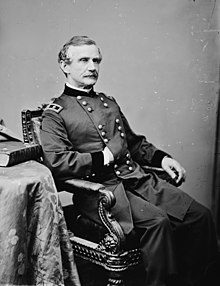Andrew A. Humphreys
| Andrew A. Humphreys | |
|---|---|

Andrew A. Humphreys
|
|
| Born |
November 2, 1810 Philadelphia, Pennsylvania |
| Died | December 27, 1883 (aged 73) Washington, D.C. |
| Place of burial | Congressional Cemetery |
| Allegiance |
United States of America Union |
| Service/branch |
United States Army Union Army |
| Years of service | 1831–1879 |
| Rank |
|
| Commands held |
II Corps US Army Corps of Engineers |
| Battles/wars |
Seminole Wars American Civil War |
| Relations |
Joshua Humphreys (Grandfather) Samuel Humphreys (Father) Letitia Atkinson (Mother) Rebecca Humphreys Hollingsworth (Wife) Henry Humphreys (Son) |
| Other work | Authored Report upon the physics and hydraulics of the Mississippi River (1861) From Gettysburg to the Rapidan (1883) and The Virginia Campaign of '64 and '65 (1883) |
Andrew Atkinson Humphreys (November 2, 1810 – December 27, 1883), was a career United States Army officer, civil engineer, and a Union General in the American Civil War. He served in senior positions in the Army of the Potomac, including division command, chief of staff, and corps command, and was Chief Engineer of the U.S. Army.
Andrew Atkinson Humphreys was born in Philadelphia, Pennsylvania, to a family with Quaker ancestry. His grandfather, Joshua, was the “Father of the American Navy,” who had served as chief naval constructor from 1794-1801 and designed the first U.S. warship, including the USS Constitution (“Old Ironsides”) and her sister ships. Andrew’s father, Samuel designed and built the USS Pennsylvania, the largest and most heavily armed ship at the time. Samuel, like his father, was a chief naval constructor from 1826-1846. Andrew graduated from Nazareth Hall (predecessor to the present day Moravian College & Theological Seminary).Thereafter entering the United States Military Academy, more commonly known as West Point, at the age of seventeen. He graduated from the Academy on July 1, 1831. Upon graduation Humphreys joined the second artillery regiment at Fort Moultrie in South Carolina. Near the beginning of the Seminole Wars he followed his regiment in the summer of 1836 to Florida where he received his first combat experience, while also falling ill, having to leave by September.de Peyster, who rose to brevet major general for the New York Volunteer Army during the Civil War and later Civil War historian says:
...
Wikipedia
